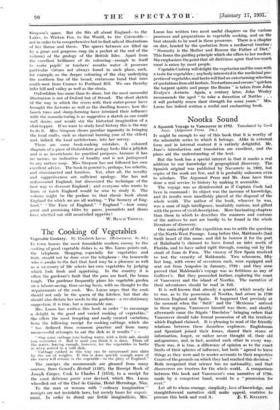The Cooking of Vegetables
cooking of good vegetable dishes is, as Mrs. Lucas points out, the telephone. Shopping, especially for vegetables and fruit, should not be done over the telephone : the housewife who is awake to the fact that food inay be a pleasure as well as a necessary of life selects her own vegetables by judging
which- look fresh and appetising. In the country it is often the gardener's fault that the peas are hard, the beans tough. The gardener frequently plans his vegetable garden on a labour-saving, time-saving basis, with no thought to the requirements of the cook.. Mrs. Lucas urges that the cook should not only be the queen of the kitchen,_ but that* she should also dictate her needs to the gardener—a revolutionary suggestion, it is true, but a reasonable one. *
Mrs. Lucas has written this book in order "to encourage a delight in the good and varied cooking of vegetables." She offers the most tempting and easily created variations from the following receipt for cooking cabbage, which she " has deduced from common *practice- and* from many unsuccessful attempts to eat the dish as it results" :— " Slap some cabbage into boiling water, with a little salt, should you remember it. Boil it until you think it is done. Drain off the water, leaving enough, however, for the vegetables to bathe in when served in a cold dish.
Cabbage cooked in this way can be compressed into slabs by the use of weights. If this is done quickly enough some of the water will remain in the vegetable—to the glory of England."
The receipts she recommends are gleaned from ninny sources, from Gerard's Herball (1597), the Receipt Book of Joseph Cooper, Cook to Charles I 0654 to a receipt for the most delicious purée ever devised, which Mrs. Lucas wheedled out of the Chef de Cuisine, 'Hotel Hermitage, Nice.
To the man or woman with "culinary imagination" receipts are not inviolable laws, but merely bases for experi-
ment. In order to direct our ?Calle ginifióiis, MiS7 Lucas has written two most useful chapters on the various processes and preparations in vegetable cooking, and on the best utensils to be used in these processes. There is a chapter on diet, headed by the quotation from a mediaeval treatise : "Necessity is the Mother and Reason the Father of Diet." This forms the guiding principle which she offers to her readers. She emphasizes the pointthat all dieticians agree thattoo much meat is eaten by most people. Vegetable Cookery will delight the vegetarian and the man with a taste for vegetables ; anybody interested in the medicinal pro- perties of vegetables and herbs will find an entertaining selection of quotations from old herbals. Nasturtium and cresses " quicken the torpent spirits and purge the Brains" is taken from John Evelyn's Acetaria. Again, a century later, John Wesley recommends the aged "to take a decoction of Nettles . . . it will probably renew their strength for some years." Mrs. Lucas has indeed written a useful and enchanting book.




































 Previous page
Previous page